As a common symbol throughout typographic history, the heart shape has found its way into many character sets and encodings, including those of Unicode. Some characters depict the shape directly, others reference it in a more derived manner.
History
In the 1990s, NTT DoCoMo released a pager that was aimed at teenagers. The pager was the first of its kind to include the option to send a pictogram as part of the text.[1][2] The pager only had a single pictogram on its options, which was a heart-shaped pictogram. This is thought to be Shigetaka Kurita's first exposure to the use of digital symbols in text form. The pager received rave reviews in Asia which led to other companies in the region to consider using pictograms in the list of text characters. NTT DoCoMo then released another pager aimed at businesspeople, but this time dropped the heart pictogram from the characters on the pager. Following its release, there was an outcry by users that the pictogram was no longer available, and many customers switched to other providers that had now included a heart pictogram in their markup. This led NTT DoCoMo to reverse their decision and include the heart pictogram.[3]
As the emoji became more popular, other heart colours were launched by Unicode. Since then, each heart color has been given its own meaning.[4]
In early 2022, Middle Eastern news publications suggested that sending a Red Heart emoji on WhatsApp in Saudi Arabia could amount to harassment and if convicted, the sender could serve a maximum sentence of two years in jail.[5]
Notable characters
Red Heart
The Red Heart (❤️) emoji is an ideogram that is used in communication to express care and as a romantic gesture. It is frequently seen as the most popular emoji in surveys conducted by NTT DoCoMo.[6]
Encoding
Unicode provides various heart symbols:[7]
- U+2665 ♥ BLACK HEART SUIT
- U+2764 ❤ HEART
- U+1F48C 💌 LOVE LETTER
- U+1F48F 💏 KISS
- U+1F60D 😍 SMILING FACE WITH HEART-SHAPED EYES (better known as the face with heart eyes emoji)
- U+1F618 😘 FACE THROWING A KISS
- U+1F63B 😻 SMILING CAT FACE WITH HEART-SHAPED EYES
- U+1F491 💑 COUPLE WITH HEART
- U+1F493 💓 BEATING HEART
- U+1F494 💔 BROKEN HEART
- U+1F495 💕 TWO HEARTS
- U+1F496 💖 SPARKLING HEART
- U+1F497 💗 GROWING HEART
- U+1F498 💘 HEART WITH ARROW
- U+1F49D 💝 HEART WITH RIBBON
- U+1F49E 💞 REVOLVING HEARTS
- U+1F49F 💟 HEART DECORATION
- U+1F5A4 🖤 BLACK HEART
- U+1FAF6 🫶 HEART HANDS
References
- ↑ "WORLDKINGS - Worldkings News - Asia Records Institute (ASRI) – Shigetaka Kurita: World's first designer created emoji sets". Worldkings - World Records Union. Retrieved 2023-04-28.
- ↑ "The Origin Of The Word 'Emoji'". Science Friday. Retrieved 2023-04-28.
- ↑ Mayer, Johanna. "The Origin Of The Word 'Emoji'". Science Friday.
- ↑ Hsieh, Carina; Varina, Rachel (5 August 2021). "The Color of the Heart Emoji You Send Is Seriously Important". Cosmopolitan. Retrieved 16 August 2022.
- ↑ Nasrallah, Tawfiq (13 February 2022). "Sending red heart emojis on WhatsApp 'can land user in jail' in Saudi Arabia". Gulf News. Dubai. Retrieved 16 August 2022.
- ↑ Kraus, Rachel (February 14, 2020). "Heart emoji, ranked". Mashable.
- ↑ "Heart symbol".




